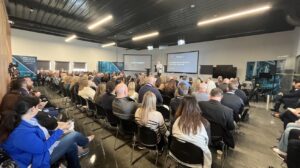At SparkCognition’s Time Machine conference, industry leaders from a variety of fields gathered to share insights into how AI is changing their business. Attendees were treated to two days of insightful discussion on topics as diverse as healthcare, aviation, financial services, military, and more (see the recaps of day 1 and day 2). Yet despite this wide range of subjects, several commonalities emerged as trends in the growing industry of AI.
-
AI is having an impact
“This is real” was echoed over and over by speakers at Time Machine. From the robots zooming around Dr. Peter Stone’s office (he added that every year it gets harder for humans to beat the robot soccer team) to models predicting stock prices or breakdowns at an oil well, AI has proven its value in a variety of industries. As General John Allen, USMC (ret.) noted, “AI is no longer theoretical, AI is no longer in the laboratories. AI is being implemented today.”
-
AI is changing the way we work
As Mobeen Khan from AT&T brought up during the IIoT panel, “You can build the right systems, but unless you change the way you work, it won’t be useful.” Access to data was a challenge discussed by many in their path to AI implementation. Moiz Kahari of State Street discussed how financial services companies can use over 1,600 applications, each with a unique data silo, creating issues with reconciliation and pulling complete data sets. Members of the panel of AI in energy similarly voiced a need to work collaboratively to share data across an ecosystem and streamline communications.
-
Autonomous robots are not taking all our jobs
Relatedly, automation and fears of job loss came up several times during the conference. Zaib Husain of Makerarm brought numbers to the discussion, estimating that activities that people are paid $16T in wages for can be automated with current tech. However, she also pointed out that in 1900, 38% of the U.S. was employed in agriculture, while thanks to automation that number is now around 2%. Dr. Greg Hyslop of Boeing gave the example that AI is incorporated in the cockpit to ensure safety based on increased traffic, not to be autonomous. In his talk, Soma Somasundaram provided evidence that “collaborative intelligence can lead to extraordinary possibilities.”
-
Explainability is essential
Abhi Seth of Honeywell said one of the biggest challenges of AI will be “making it so people don’t think it’s magic.” This point was particularly hammered home by Moiz Kahari speaking of the financial industry and Dick Foster of the healthcare industry: AI must be able to explain itself in order to accommodate regulatory rules. Fortunately, this is something companies are working towards, as the product announcements for SparkCognition’s DeepArmor Enterprise and Darwin automated model building both included elements to show how the algorithm worked and allow for human adjustments.
-
AI implementation is not just checking a box
The many successful use cases of AI from Time Machine all had one thing in common: strategic implementation. This includes choosing the right problem, considering and evaluating a partnership, and getting access to data. During the panel on AI in energy, Ali Raza of Dover Energy and Ben Wilson of Google spoke about the importance of figuring out the core competencies of a business and building a use case for AI around that. Dick Foster also mentioned careful financial evaluation, pointing out that in healthcare, it’s unclear if costs will be lowered due to AI, or raised as more people realize they’re sick.
-
AI is not one thing
AI is a collection of technologies, with each new application requiring specific research and development and regulatory consideration. The ending takeaway from Dr. Peter Stone’s speech, this point also rang true in the discussion of AI in policy, AI in the military, and by the breadth of speakers present at Time Machine presenting uses of AI in their particular industry. As Dr. Michael Horowitz of the University of Pennsylvania concluded, “We’re not talking about a weapon, we’re talking about something that’s going to be part of everything.”
















